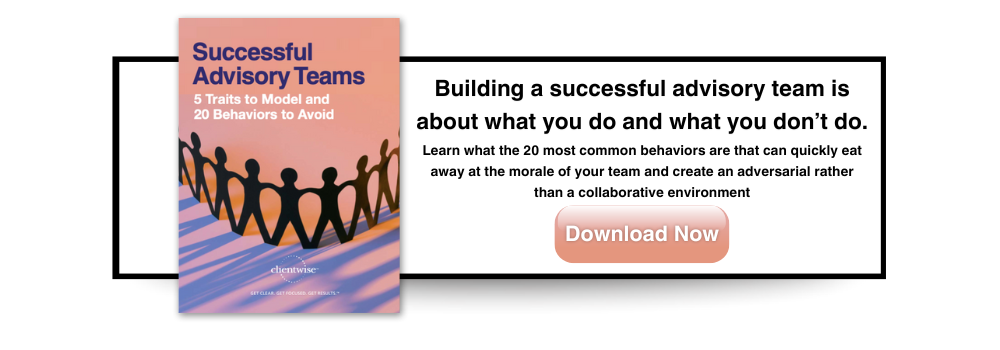Founder-Focused Firms Fail to Scale: The Pitfalls of Single-Leader Advisory Firms and How to Change the Game
In many cases, a founder's vision serves as the guiding light for his or her advisory firm's operations. Their expertise, passion, and drive are pivotal in establishing the company's identity and direction. As the business grows, however, founder-focused firms face unique challenges that can significantly impede their ability to scale effectively. Specifically, watch out for the following five pitfalls, which may serve as important signals that an alternative approach with expanded leadership is needed to ensure more sustainable growth:
-
The Founder's Dilemma
Founders are typically deeply invested in their businesses – both emotionally and intellectually. Their vision shapes every aspect of the firm, from investment strategies to client relationships. While this level of involvement can be highly advantageous in the early stages, it often hinders companies as they grow and expand.
The result is a bottleneck effect. Because most or all of the decision-making authority is concentrated in the founder’s hands, delays and inefficiencies tend to snowball as the organization grows. Unfortunately, fear of losing control or straying from their original vision makes founders reluctant to loosen the reins and delegate major responsibilities – a pitfall that many need help and support in overcoming.
-
Limitations of Singular Expertise
Founders often possess specialized expertise that sets them apart in the industry. Whether it's a deep understanding of a particular investment strategy, familiarity with the unique financial needs and challenges of a particular profession, or an innate knack for building strong client bonds, their skills are instrumental in driving early success.
However, relying too heavily on the founder's expertise can create major vulnerabilities as the firm expands. For instance, if the founder is the sole expert in a critical business area, such as portfolio management or business development, the firm becomes overly reliant on his or her capabilities. Not only does this limit scalability, but it also poses a considerable risk in the event of the founder's absence, disability, or departure.
-
Impeding a Collaborative Culture
By the sheer nature of their structure, founder-focused firms often struggle to foster a culture of collaboration and empowerment. To be successful, decision-making authority needs to be decentralized, and a team of skilled professionals who can contribute their expertise to the firm's success must be cultivated.
Encouraging open communication and shared ownership of goals and objectives is essential to building an effective cohesive team. By empowering employees to take on leadership roles and contribute their unique perspectives, firms can tap into broader insights and ideas, driving innovation and growth.
-
Failing to Embrace Technology and Automation
Another key factor in scaling a financial advisory firm is leveraging technology and automation to streamline processes and increase efficiency. By implementing digital tools for client management, portfolio analysis, and administrative tasks, firms can reduce the burden on individual employees and free up time for strategic initiatives. Furthermore, technology can enhance the client experience by providing personalized recommendations and real-time insights. This improves client satisfaction and enables advisors to serve a larger client base without sacrificing quality.
In founder-focused firms, however, technology and automation often lag. Single leaders are more likely to “stick to the way we’ve always done things,” and more tech-savvy team members may not feel empowered to introduce new ideas, innovations, and process enhancements.
-
Inability to Build a Sustainable Succession Plan
What happens when the founder is no longer there? Developing a robust succession plan is one of the most critical aspects of scaling an advisory business – and one of the most challenging for founder-focused firms.
Succession planning involves identifying and developing future leaders to ensure continuity and stability during leadership changes. This involves implementing mentorship programs, providing leadership training, and creating clear pathways for career advancement. Investing in developing future leaders from within the firm (and providing them with real-life opportunities to lead) is necessary to mitigate the risks associated with founder dependence and ensure a smooth transition when the time comes.
While founders play a vital role in shaping the identity and direction of financial advisory firms, a singular focus on the founder can impede scalability and hinder long-term success. By fostering a collaborative culture, embracing technology, and developing a sustainable succession plan, firms can overcome the limitations of founder-centric models and achieve sustainable growth.
In today's rapidly evolving financial landscape, adaptability and innovation are essential for staying ahead of the curve. By shifting the focus from individual founders to collective leadership and collaboration, financial advisory firms can position themselves for success in the future.
Like the blog? Be sure to subscribe to stay up to day with The ClientWise Blog!
Topics: Leadership Business Planning



